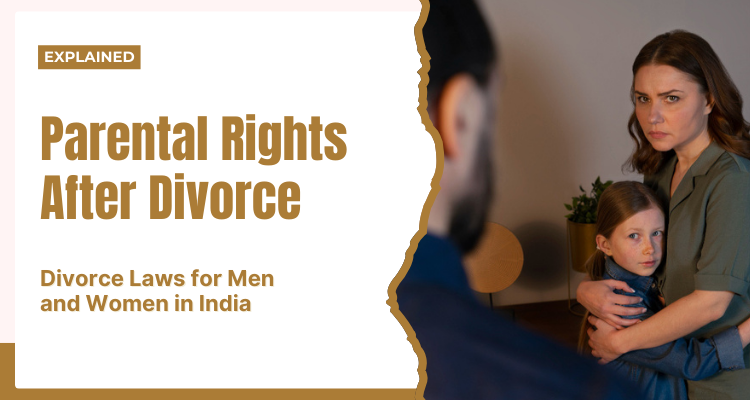Parental Rights After Divorce: Divorce Laws for Men and Women in India

Posted Mar 2025
Divorce often results in critical disputes over custodial rights, with concerns about child custody, access rights, and financial responsibilities. In India, laws are responsible for balancing the rights of both parental as well as child welfare rights.
In this article, we will explore the different types of divorce laws based on men and women, different parental rights after divorce, and the various factors courts consider while granting custody under different law acts.
What are Divorce Laws in India
In India, divorce laws differ based on religion including the Hindu Marriage Act, Muslim Personal Law, Special Marriage Act, and Indian Divorce Act regulating marriages across various faiths. Both men and women have the right to file for divorce on grounds such as adultery, cruelty, desertion, mental instability, and other legally valid and well-known reasons.
Divorce Laws for Men
A husband has the right to file for a divorce petition, either with or without mutual consent as the grounds for divorce are the same for both men and women, such as cruelty, separation without cause, conversion of religion, cheating in marriage, mental disorders, legal death assumption, and many more.
Here are some key points that need to be discussed regarding the Divorce Laws for Men.
- Under the Hindu Marriage Act of 1955, a husband can file for divorce if his wife is unfaithful, has left him for at least two years, or has an unrecoverable mental illness.
- Muslim men can divorce their wives through Talaq, Talaq-e-Hasan, or Talaq-e-Bidat, depending on the Supreme Court’s decision.
- Christian men can file for divorce under the Indian Divorce Act of 1869 on grounds of cruelty, adultery, or desertion.
- Men can seek divorce on grounds such as cruelty, dissertation, mental illness, or their partner’s religious conversion.
Divorce Laws for Women
In India, divorce laws are governed by personal laws that are based on religion. The personal laws governing divorce differ depending on the religion of the parties involved. Here are some key points that need to be discussed regarding Divorce Laws for Women.
- The Hindu Marriage Act, of 1955 governs divorce among Hindus, Buddhists, Jains, and Sikhs,
- The Muslim Personal Law (Shariat) Application Act, of 1937 and the Dissolution of Muslim Marriage Act of 1939 govern divorce among Muslims,
- The Divorce Act, of 1869 governs divorce among Christians,
- The Parsi Marriage and Divorce Act, of 1936 governs divorce among Parsis.
Each of these laws has its provisions and requirements for seeking a divorce, including grounds for divorce, procedures to be followed, and provisions for maintenance and custody of children.
What Are Parental Rights After Divorce?
Parental Rights After Divorce states that after the separation between two partners, decisions about the child’s custody, support, and well-being of the child are based on their best interests. This includes deciding the child’s primary guardian, custody access, and financial support.
Parental rights include a parent’s legal duties for their child’s care, education, and well-being. After divorce, the court decides custody based on the child’s best interests, considering both parents’ financial, emotional, and moral stability.
What Factors Court Consider While Granting Custody
Child custody is a crucial aspect of divorce, with both parents trying to secure legal guardianship. It is a challenging process for parents and the child often influenced by extended family. While mothers are generally preferred in India, courts prioritize the best interest.
Custody is granted to the parent who is more suitable for the child’s upbringing, considering financial stability, and parenting abilities. Here are three main categories for granting custody:
Custody Under Hindu Law
The Guardianship and Welfare Act of 1890 governs the appointment of guardians regardless of caste, religion, or community. The following are the factors consider by court under Hindu Law –
- Children below the age of five are generally entrusted to their mother’s care.
- Older boys are typically placed with the father and girls with the mother, but the child’s well-being is the primary factor.
- A child over the age of nine can state their preference, but it must match with their best interests.
- A mother who has failed to care for his child during the early childhood phase will not get custody.
Custody Under Muslim Law
The mother has the primary right to child custody and cannot be denied it unless proven guilty of misconduct. This right applies against the father or any other individual. The father’s right to Hizanat is recognized under all Muslim laws but only if the mother is absent or when the child reaches the age limit for maternal custody.
Custody Under Christian Law
Christian law does not impact child custody, but the Indian Divorce Act applies to all religions in India.
The child’s welfare is the court’s top priority when deciding custody, based on several factors:
- The age, gender, and religious background of the child.
- The guardian’s character and ability, while false accusations from parents are ignored
- Any financial factors, including family wealth, to ensure custody is not sought for monetary gain
- The child’s choice is typically taken into account if they are above nine years old.
- Staying with siblings together to maintain emotional well-being
- A parent who fails to follow the court’s order may lose custody if the other parent contests it.
When you are seeking a divorce settlement or want to protect your parental rights after divorce, you should consult the best divorce lawyer in Delhi. In this regard, Chambers of Mohit Singh, a premier law firm in Delhi, will be your best companion to get justice and provide the best possible settlement for your case.
Frequently Asked Questions
The law regarding children after a divorce depends on the country or state where the divorce takes place. Generally, child custody and support laws focus on the best interest of the child.
No one owns children after divorce. Custody is determined by the court based on the child’s best interests, granting either sole or joint custody to one or both parents.
Under the Hindu Law Act, custody of the child is decided based on the child’s welfare. Generally, mothers get custody of young children, but courts may grant custody to either parent considering the child’s best interest.
In India, a child’s right to property does not change after their parents’ divorce. They can still inherit their parents’ and family’s property, no matter which parent takes care of them.
In India, a wife cannot claim her husband’s property after divorce but she can ask for alimony or settlement. She has rights in shared property but not in inherited family property.
To win child custody in India, a mother must prove she can provide the child’s best welfare, including emotional, financial, and educational support. Generally, courts give custody of younger children to mothers. Chambers of Mohit Singh, a top law firm in Delhi, helps with child custody cases. Their legal expertise improves a mother’s chances of winning custody.

